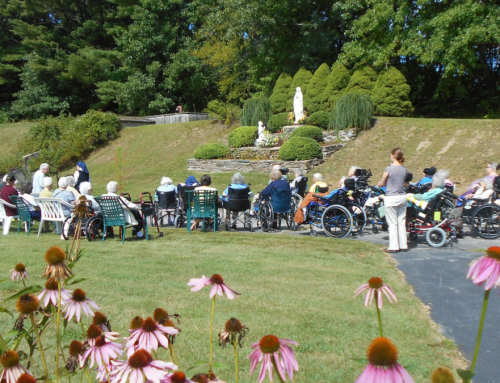As we age, our physical and mental health can decline, leaving us feeling lonely and isolated. For residents of assisted living facilities, this feeling can be particularly strong. However, there is a simple solution that has been shown to have incredible benefits for the elderly: pet therapy.
Pet therapy involves bringing a trained animal, typically a dog or cat, to visit patients in hospitals, nursing homes, or assisted living facilities. The animals are carefully screened and trained to ensure that they are well-behaved and gentle with patients. During these visits, patients can interact with the animals by petting them, playing with them, or simply enjoying their company.
The benefits of pet therapy for the elderly are numerous. One of the most significant benefits is that it can help to reduce feelings of loneliness and social isolation. For many elderly people, especially those living in assisted living facilities, social interactions can be limited. Having a furry friend to interact with can help to provide companionship and reduce feelings of loneliness.
Another benefit of pet therapy is that it can help to improve mood and reduce symptoms of depression. Many elderly people struggle with depression, which can be exacerbated by social isolation and other health issues. Interacting with animals has been shown to increase levels of the hormone oxytocin, which is associated with feelings of happiness and well-being. Additionally, petting an animal can be soothing and calming, helping to reduce stress and anxiety.
In addition to the psychological benefits, pet therapy has also been shown to have physical benefits for the elderly. For example, interacting with animals can help to lower blood pressure and improve cardiovascular health. Additionally, playing with animals can help to improve mobility and flexibility, which is particularly important for elderly people who may struggle with these issues.
One of the most remarkable benefits of pet therapy is its ability to stimulate memories and cognitive function in elderly patients with dementia or Alzheimer’s disease. Many patients with these conditions struggle with memory loss and cognitive decline. However, interacting with animals can help to stimulate memories and improve cognitive function. For example, a patient who owned a dog in the past may be able to recall memories of their pet when interacting with a therapy dog.
The benefits of pet therapy are not just limited to the elderly. In fact, pet therapy has been shown to have benefits for patients of all ages. For example, children undergoing cancer treatment have been shown to benefit from interacting with therapy dogs, which can help to reduce anxiety and improve their overall mood.
In conclusion, pet therapy is a simple but powerful tool that can have numerous benefits for the elderly. For residents of assisted living facilities, who may struggle with feelings of loneliness and isolation, pet therapy can provide much-needed companionship and social interaction.
Additionally, pet therapy has been shown to have numerous physical and psychological benefits, including improving mood, reducing depression and anxiety, and stimulating memories and cognitive function in patients with dementia and Alzheimer’s disease. If you or a loved one is struggling with any of these issues, consider exploring the benefits of pet therapy today.
Please contact us today for more information about our pet therapy programs.
Matulaitis Rehabilitation and Skilled Care is the leading non-profit skilled nursing facility in Northeast Connecticut. We are proud to receive top national rankings and the highest five-star rating from Medicare’s Nursing Home Compare. Our dedicated staff combines renowned care and exceptional nursing skills with a holistic approach. We fully realize that the restoration of your health and well-being after an illness, operation, or injury can be incredibly difficult.
Our long term care features attention to the whole person, assuring individualized care for fullness of living, spiritual welfare, and providing a sense of community with enriching programming. We invite you to learn more about our special smoke-free facility as you consider your own or a loved one’s needs.






